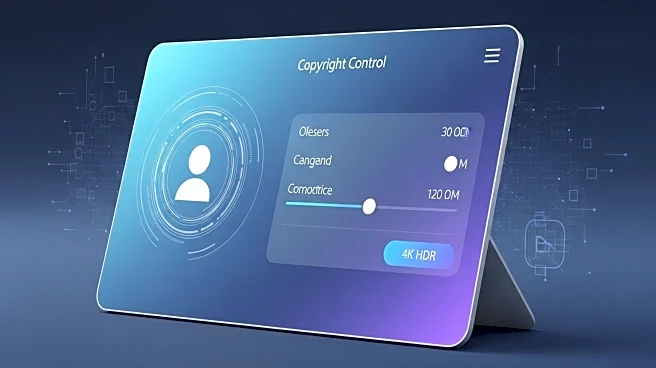What's Happening?
OpenAI is revising its approach to copyright and intellectual property management in its new video application, Sora. Initially, OpenAI required Hollywood studios and agencies to opt out if they did not want their intellectual property included in Sora-generated videos. However, following feedback, OpenAI plans to implement more granular opt-in controls for copyright holders. This change aims to prevent unauthorized use of copyrighted characters unless explicit permission is granted. Sora, which allows users to upload biometric data for digital likenesses in AI-generated videos, has quickly gained popularity despite being invite-only. The app's unique feature, 'cameos,' has led to users creating videos with popular characters, sometimes critiquing OpenAI's copyright approach.
Why It's Important?
The introduction of opt-in copyright controls is significant as it addresses concerns from rightsholders about unauthorized use of their intellectual property. This move could set a precedent for how AI-generated content is managed, potentially influencing industry standards. By allowing rightsholders to specify how their characters can be used, OpenAI is fostering a more collaborative relationship with content creators and studios. This approach may enhance the value of interactive fan fiction and engagement, benefiting both OpenAI and rightsholders. Additionally, OpenAI's plans for video monetization could create new revenue streams, possibly shared with rightsholders, further incentivizing collaboration.
What's Next?
OpenAI plans to implement unspecified video monetization strategies, potentially sharing revenue with rightsholders. This could lead to new business models in the AI content creation industry. As OpenAI refines its copyright controls, it may face challenges in managing edge cases where unauthorized content slips through. The company's ongoing dialogue with rightsholders will be crucial in shaping the future of AI-generated media. Stakeholders, including studios and content creators, will likely monitor these developments closely, assessing the impact on their intellectual property rights and revenue opportunities.
Beyond the Headlines
The shift to opt-in copyright controls highlights broader ethical and legal considerations in AI content creation. As AI technology advances, the balance between innovation and intellectual property rights becomes increasingly complex. OpenAI's approach may influence how other companies handle similar issues, potentially leading to industry-wide changes in copyright management. The ethical implications of using biometric data for digital likenesses also warrant attention, as privacy concerns and consent become critical factors in user engagement.








